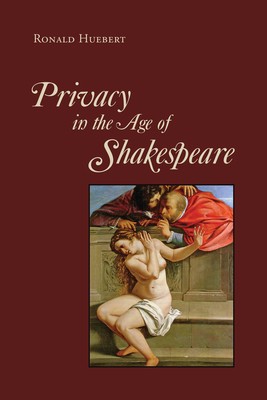
- We will send in 10–14 business days.
- Author: Ronald Huebert
- Publisher: University of Toronto Press
- ISBN-10: 1442647914
- ISBN-13: 9781442647916
- Format: 15 x 23.1 x 3.3 cm, hardcover
- Language: English
- SAVE -10% with code: EXTRA
Reviews
Description
For at least a generation, scholars have asserted that privacy barely existed in the early modern era. The divide between the public and private was vague, they say, and the concept, if it was acknowledged, was rarely valued. In Privacy in the Age of Shakespeare, Ronald Huebert challenges these assumptions by marshalling evidence that it was in Shakespeare's time that the idea of privacy went from a marginal notion to a desirable quality.
The era of transition begins with More's Utopia (1516), in which privacy is forbidden. It ends with Milton's Paradise Lost (1667), in which privacy is a good to be celebrated. In between come Shakespeare's plays, paintings by Titian and Vermeer, devotional manuals, autobiographical journals, and the poetry of George Herbert and Robert Herrick, all of which Huebert carefully analyses in order to illuminate the dynamic and emergent nature of early modern privacy.
EXTRA 10 % discount with code: EXTRA
The promotion ends in 10d.15:13:27
The discount code is valid when purchasing from 10 €. Discounts do not stack.
- Author: Ronald Huebert
- Publisher: University of Toronto Press
- ISBN-10: 1442647914
- ISBN-13: 9781442647916
- Format: 15 x 23.1 x 3.3 cm, hardcover
- Language: English English
For at least a generation, scholars have asserted that privacy barely existed in the early modern era. The divide between the public and private was vague, they say, and the concept, if it was acknowledged, was rarely valued. In Privacy in the Age of Shakespeare, Ronald Huebert challenges these assumptions by marshalling evidence that it was in Shakespeare's time that the idea of privacy went from a marginal notion to a desirable quality.
The era of transition begins with More's Utopia (1516), in which privacy is forbidden. It ends with Milton's Paradise Lost (1667), in which privacy is a good to be celebrated. In between come Shakespeare's plays, paintings by Titian and Vermeer, devotional manuals, autobiographical journals, and the poetry of George Herbert and Robert Herrick, all of which Huebert carefully analyses in order to illuminate the dynamic and emergent nature of early modern privacy.


Reviews